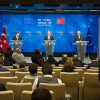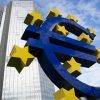
The concept of a ‘multi-speed Europe’ –the idea that some EU member states should move ahead with more integration despite the resistance or lack of interest of others– is back. At least it is in the rhetoric of some European leaders. The German Chancellor, Angela Merkel, and the French President, François Hollande, have both shown an interest in further differentiated integration. They have recently been joined by the Spanish and Italian Prime Ministers, Mariano Rajoy and Paolo Gentiloni, in Versailles. The four met in order to discuss a message for the celebrations of the 60th anniversary of the Treaties of Rome, to be held in the city on 25 March. Hollande has said that if the EU fails to pursue a path of multi-speed integration it will ‘explode’; Merkel, meanwhile, has commented that in the absence of differentiated integration the EU would ‘probably get stuck’. However, exactly in what sectors a group of EU member states should move forwards towards closer integration remains a bit of mystery. Hollande has mentioned ‘defence, fiscal or social harmonisation, research, culture, youth’.
These initiatives follow a well-known pattern. The idea that every crisis offers an opportunity for further EU integration is a commonplace in Brussels and in many capitals. But is more integration really the solution to the EU’s current problems? Is the EU stuck because some member states –the big four who met in Versailles and some others– are in agreement about further integration and are just held back by the rest, who are unwilling or unable to join them? Should that be the case, a further push towards differentiated integration or a multi-speed EU would make some sense.
However, on the most pressing issues, divisions still run deep, even among the big four who met in Versailles. And which are these most pressing issues? First, the question of economic governance, brought to the forefront by the Euro and Greek crises; secondly, the spill-over effects of conflict in the Middle East and North Africa in the form of mass migration and increased terrorism; and third, the tensions with Russia over the shared neighbourhood. These three fundamental crises are further aggravated by Brexit and the election of Donald Trump as US President; the White House now appears to view the EU in a similar way to Britain’s Eurosceptics.
The three issues are at the centre of a Europe-wide debate, with countries taking different views about how to deal with them. Negotiations on them issues have reached a dead-end, with everyone entrenched in well-known positions, driven by varying views and interests. Although differences have been bridged to a certain extent, they have not really been addressed. And that is where the EU has become bogged down.
In order to reboot the EU, its leaders must address these issues in novel ways. Creating new institutions in Brussels or signing new agreements will not help. The challenge is essentially a matter of political will in the Union’s member states. That is why the debate must be taken back to the member states themselves. It must become clear both to citizens and their political representatives that there can be trade-offs between different political choices, that compromises should be accepted and that it is impossible to have it all. What is needed is a grand agreement, a new deal.
So what issues need to be discussed? The first is the conflict between the South and the North/North-East over the principles of economic governance: what rules, how much joint risk and how much redistribution? The second is the conflict regarding foreign policy and defence: how can engagement in the South be balanced with engagement in the East? The third topic is asylum, migration and joint borders: what are the criteria for letting foreigners in and how should the protection of joint borders be organised? All these questions are deeply political and touch on core elements of sovereignty.
In the past, building the EU was mainly a task for leaders. They met in Brussels, fought over the issues involved and came up with compromises amongst themselves, which they then sold to their domestic audiences. But such a method no longer works, for two reasons. On the one hand, the issues at stake are at the core of domestic politics. On the other, growing populism and the revolution in the public sphere make it necessary for leaders to bring back their decisions to their voters.
A new deal for Europe will be far harder to achieve than an agreement among the EU’s leaders in Brussels about creating news institution or mechanisms. There are painful trade-offs involved, for all countries. But in order to overcome the growing divisions and mounting frustrations in Europe, and to set the EU on a firmer and longer-term course, new ways must be found. If the fundamental issues are left unaddressed, if Europe’s leaders merely remain content with largely symbolic acts, the Union’s citizens will turn against the establishment and the very concept of a united Europe.
Finding a new internal balance is especially important at a time when Europe needs to be both able and willing to play a bigger role on the world stage. With Trump, the US will likely move towards a more multipolar concept of the international world order, something that Russia and China have been pushing for over the past few years. If Europe wants to be more than a battlefield on which the great powers compete for influence, it must overcome its internal sclerosis and become a force that others should have to reckon with.


